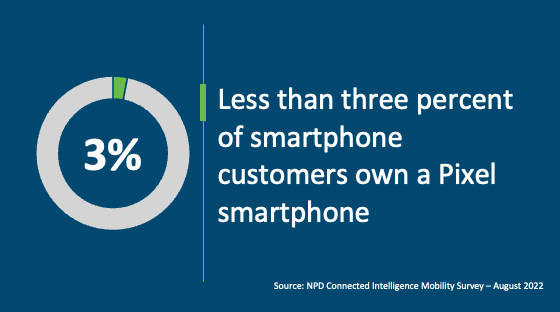
Google launches the Pixel watch… finally!
Google’s Made by Google event had a giddy array of Pixel products, from a new smartphone top a tablet and, of course, the Pixel Watch. The reviews are all pretty gushing and, to be fair, it appears to be a well thought out, elegant-looking watch that comes packed full of features. It has an always-on screen, real-time heart rating tracking, automatic exercise detection and so on. Notably, the integration with Fitbit seems to be robust, with most of the fitness and health features coming from Fitbit (including Fitbit’s ECG which will support Afib detection), as well as a free trial of Fitbit Premium. Battery life is a claimed 24 hours, with 50% re-charge in 30 minutes. The watch comes in two versions: the WiFi model ($349) and LTE ($399).
The NPD Take:
- But, and there is always a “but” isn’t there, it’s unclear just how big the market potential for the Pixel Watch is. We’ve discussed this point previously but it is worth revisiting: at $349/$399 the Pixel watch is not a “low-end” device. And it won’t turn any Apple customers back to the Android world. That leaves the Pixel watch competing against Samsung (Google’s key partner inn WEAR) and Fitbit, which is owned by Google.
- But perhaps that is not the point of the Watch. After all, the Pixel smartwatch hardly competes head-to-head with Samsung. Rather, Google’s Pixel products are often seen more as a show case for Wear with the goal of driving interest in the entire category forward.
Nreal brings AR to the US… sort of
Nreal has launched its Air augmented reality glasses in the US, with a price tag starting at $379. Except… it does cause a little bit of debate as to what “augmented reality” is. In “real” reality, we would position these somewhat differently. They are really glasses that provide a screen – a monitor in glasses form if you will – rather than AR, which is supposed to enhance the objects we see around us, rather than close us off from them. That’s the bad news. The more interesting news is that there may be some interesting use cases for these devices. The obvious one is watching movies from your phone or laptop when on a plane, but if the devices mirror your phone and/or computer, then they could provide an enhanced mobile work environment too.
The NPD Take:
- Working remotely – rather than at your desk of choice – brings compromises. You need a monitor of sorts, whether your laptop screen or your smaller smartphone screen. But consider if you could work from your smartphone while still having a large screen via these glasses: that could make mobile working so much easier (with less to carry). Of course, there is still the matter of a keyboard...
Sweating the numbers
Gatorade plans to launch a smart water bottle (although we suspect “smart Gatorade bottle” would be more appropriate) to help you track hydration levels and your post-workout recovery. In essence, the bottle has a smart cap, with a ring of LEDs that monitor your hydration, giving you a gentle nudge now and then to drink more. So far, so banal. But… Gatorade’s idea is that this bottle is used in association with the Sweat Patch which was launched last year. The stick on patch tracks your workout sweat and links into the same app that the smart bottle will use, providing a story of not just hydration for the sake of hitting your daily targets, but within the context of how badly you need to re-hydrate. And talking of the hydration part, Gatorade – of course – is selling pods that can be mixed with water to aid with the recovery process.
The NPD Take:
- We tried the sweat patch last year and came to the conclusion that while it was a clever use of discardable, stick on patches, there was little real-life use for it (yes, I work out, I sweat, I drink to recover). However, closing the loop with the hydration part of the story does make this more interesting for the more avid gym rats among us.
- That does not make the solution perfect by any means, of course, and our core issue with the solution is that the sweat patches are one-time use. That makes ongoing tracking relatively expensive over time, and seems to be incredibly wasteful. But Gatorade does seem to be on an interesting path towards tracking consumption (at least for liquid intake) that is certainly a step forward.